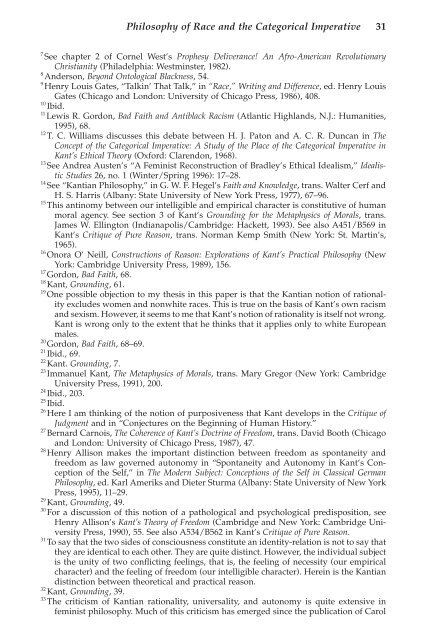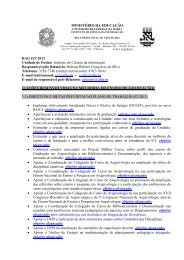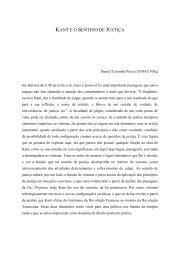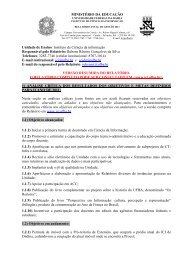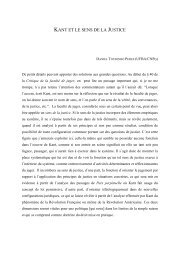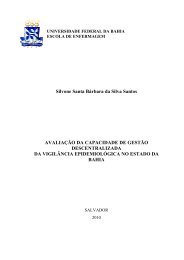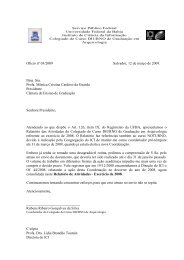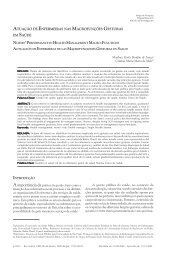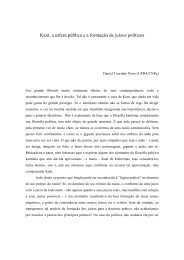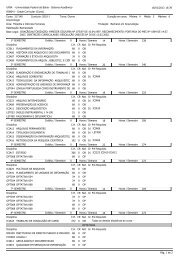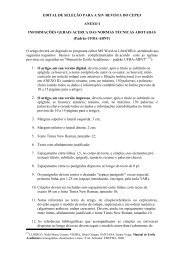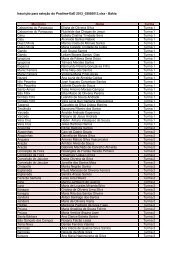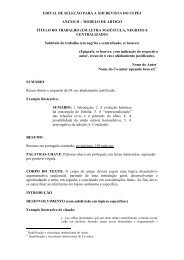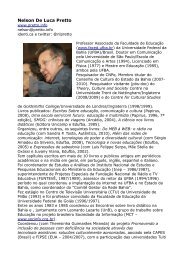Can a Philosophy of Race Afford to Abandon the Kantian ...
Can a Philosophy of Race Afford to Abandon the Kantian ...
Can a Philosophy of Race Afford to Abandon the Kantian ...
- No tags were found...
You also want an ePaper? Increase the reach of your titles
YUMPU automatically turns print PDFs into web optimized ePapers that Google loves.
<strong>Philosophy</strong> <strong>of</strong> <strong>Race</strong> and <strong>the</strong> Categorical Imperative 317 See chapter 2 <strong>of</strong> Cornel West’s Prophesy Deliverance! An Afro-American RevolutionaryChristianity (Philadelphia: Westminster, 1982).8 Anderson, Beyond On<strong>to</strong>logical Blackness, 54.9 Henry Louis Gates, “Talkin’ That Talk,” in “<strong>Race</strong>,” Writing and Difference, ed. Henry LouisGates (Chicago and London: University <strong>of</strong> Chicago Press, 1986), 408.10 Ibid.11 Lewis R. Gordon, Bad Faith and Antiblack Racism (Atlantic Highlands, N.J.: Humanities,1995), 68.12 T. C. Williams discusses this debate between H. J. Pa<strong>to</strong>n and A. C. R. Duncan in TheConcept <strong>of</strong> <strong>the</strong> Categorical Imperative: A Study <strong>of</strong> <strong>the</strong> Place <strong>of</strong> <strong>the</strong> Categorical Imperative inKant’s Ethical Theory (Oxford: Clarendon, 1968).13 See Andrea Austen’s “A Feminist Reconstruction <strong>of</strong> Bradley’s Ethical Idealism,” IdealisticStudies 26, no. 1 (Winter/Spring 1996): 17–28.14 See “<strong>Kantian</strong> <strong>Philosophy</strong>,” in G. W. F. Hegel’s Faith and Knowledge, trans. Walter Cerf andH. S. Harris (Albany: State University <strong>of</strong> New York Press, 1977), 67–96.15 This antinomy between our intelligible and empirical character is constitutive <strong>of</strong> humanmoral agency. See section 3 <strong>of</strong> Kant’s Grounding for <strong>the</strong> Metaphysics <strong>of</strong> Morals, trans.James W. Elling<strong>to</strong>n (Indianapolis/Cambridge: Hackett, 1993). See also A451/B569 inKant’s Critique <strong>of</strong> Pure Reason, trans. Norman Kemp Smith (New York: St. Martin’s,1965).16 Onora O’ Neill, Constructions <strong>of</strong> Reason: Explorations <strong>of</strong> Kant’s Practical <strong>Philosophy</strong> (NewYork: Cambridge University Press, 1989), 156.17 Gordon, Bad Faith, 68.18 Kant, Grounding, 61.19 One possible objection <strong>to</strong> my <strong>the</strong>sis in this paper is that <strong>the</strong> <strong>Kantian</strong> notion <strong>of</strong> rationalityexcludes women and nonwhite races. This is true on <strong>the</strong> basis <strong>of</strong> Kant’s own racismand sexism. However, it seems <strong>to</strong> me that Kant’s notion <strong>of</strong> rationality is itself not wrong.Kant is wrong only <strong>to</strong> <strong>the</strong> extent that he thinks that it applies only <strong>to</strong> white Europeanmales.20 Gordon, Bad Faith, 68–69.21 Ibid., 69.22 Kant. Grounding, 7.23 Immanuel Kant, The Metaphysics <strong>of</strong> Morals, trans. Mary Gregor (New York: CambridgeUniversity Press, 1991), 200.24 Ibid., 203.25 Ibid.26 Here I am thinking <strong>of</strong> <strong>the</strong> notion <strong>of</strong> purposiveness that Kant develops in <strong>the</strong> Critique <strong>of</strong>Judgment and in “Conjectures on <strong>the</strong> Beginning <strong>of</strong> Human His<strong>to</strong>ry.”27 Bernard Carnois, The Coherence <strong>of</strong> Kant’s Doctrine <strong>of</strong> Freedom, trans. David Booth (Chicagoand London: University <strong>of</strong> Chicago Press, 1987), 47.28 Henry Allison makes <strong>the</strong> important distinction between freedom as spontaneity andfreedom as law governed au<strong>to</strong>nomy in “Spontaneity and Au<strong>to</strong>nomy in Kant’s Conception<strong>of</strong> <strong>the</strong> Self,” in The Modern Subject: Conceptions <strong>of</strong> <strong>the</strong> Self in Classical German<strong>Philosophy</strong>, ed. Karl Ameriks and Dieter Sturma (Albany: State University <strong>of</strong> New YorkPress, 1995), 11–29.29 Kant, Grounding, 49.30 For a discussion <strong>of</strong> this notion <strong>of</strong> a pathological and psychological predisposition, seeHenry Allison’s Kant’s Theory <strong>of</strong> Freedom (Cambridge and New York: Cambridge UniversityPress, 1990), 55. See also A534/B562 in Kant’s Critique <strong>of</strong> Pure Reason.31 To say that <strong>the</strong> two sides <strong>of</strong> consciousness constitute an identity-relation is not <strong>to</strong> say that<strong>the</strong>y are identical <strong>to</strong> each o<strong>the</strong>r. They are quite distinct. However, <strong>the</strong> individual subjectis <strong>the</strong> unity <strong>of</strong> two conflicting feelings, that is, <strong>the</strong> feeling <strong>of</strong> necessity (our empiricalcharacter) and <strong>the</strong> feeling <strong>of</strong> freedom (our intelligible character). Herein is <strong>the</strong> <strong>Kantian</strong>distinction between <strong>the</strong>oretical and practical reason.32 Kant, Grounding, 39.33 The criticism <strong>of</strong> <strong>Kantian</strong> rationality, universality, and au<strong>to</strong>nomy is quite extensive infeminist philosophy. Much <strong>of</strong> this criticism has emerged since <strong>the</strong> publication <strong>of</strong> Carol


